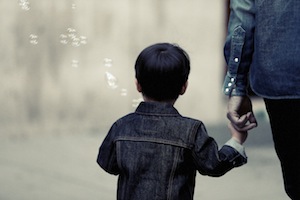A role model is someone we admire and wish to emulate—someone after whom we want to model our lives in some way. When we choose our role models, we tend to choose people who are older than us or have more life experience. We look to people like our parents; our bosses; or people deemed successful by society’s standards, like world leaders, entrepreneurs, celebrities, or famous athletes. But who says role models have to be people we look up to? What if we could look down, literally speaking, to find some of the best examples for how to live?
The way I see it, children make some of the best role models. Here’s why:
1) They’re unfiltered. Children tend to say exactly what’s on their mind (sometimes to their parents’ great embarrassment). They don’t tend to second-guess themselves or augment what they want to say in order to please others. This kind of unbridled honesty is something we can learn from. When was the last time you bit your tongue and chose to stay silent about something when you wanted to speak up? How often do you find yourself choosing your words so carefully that what you end up saying hardly resembles what you mean? As adults we regularly hold back or manipulate our words in order to satisfy other people, evade conflict, or avoid rejection. We censor ourselves, only to end up suffering the pitfalls of not speaking our truth. Children can teach us a lot about saying what we mean.
2) They’re naturally mindful. Because most experiences are new to children, they tend to approach them with what Zen Buddhists call shoshin, or “beginner’s mind.” They have a natural ability to be fully present in the here-and-now, experiencing everything through their five senses in a state of unadulterated awareness. When you think about how much we struggle to remain grounded in the present moment without getting distracted by the flood of thoughts pulling us into the past or future, it’s easy to see how much we can learn from children on this front. Children can teach us a lot about being present.
3) They understand the value of play. We’re so consumed by our commitments and responsibilities that many of us forget how to have fun. Most adults in Western society consider leisure a luxury; it ranks low on their list of priorities, if it appears there at all. But the role of play doesn’t need to be diminished as a consequence of getting older. In fact, it’s just as important for adults as it is for children. Engaging in fun, playful activities is a great way to relieve stress, improve brain functioning, fortify relationships, and boost creativity. Since children are the experts at play, who better to look to as models for how to do more of it in our own lives? Children can teach us a lot about having fun.
4) They don’t have to work at being authentic. Before children start internalizing society’s messages about who they’re supposed to be and how they’re supposed to act, they express themselves naturally and without pretense. Unless others teach them how to do it, they don’t criticize themselves or put up a front. Their original nature is to be purely, authentically themselves. And that’s our original nature too. But an adult lifetime’s worth of internalizing messages about who we should be tends to limit us from being who we are. Allow the children in your life to serve as a reminder that you don’t have to be who others want you to be—being you is wonderfully enough. Children can teach us a lot about being ourselves.
5) They ask for help when they need it. Our society prizes independence and self-sufficiency. We’re pressured to have it all together all the time; so when we don’t, we often feel like we’ve failed. Admitting that we need help can feel like a form of weakness, so we try everything in our power to avoid doing it. We wear ourselves out and go through unnecessary suffering to avoid uttering the words, “I need help.” Children are supposed to be dependent. They’re not supposed to have all the answers, and nobody expects them to do everything on their own. When they need help, they don’t hesitate to ask for it. Neither should you. Children can teach us a lot about asking for help.
When we are open to learning from them, children can serve as remarkable teachers. They can remind us of who we once were and who we can be again. They can be our greatest role models, if only we let them.
“While we try to teach our children all about life, our children teach us what life is all about.” – Angela Schwindt


